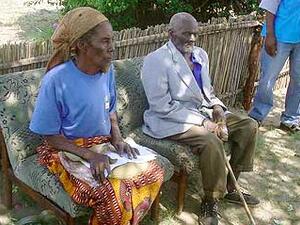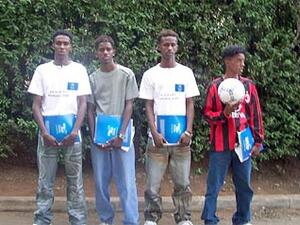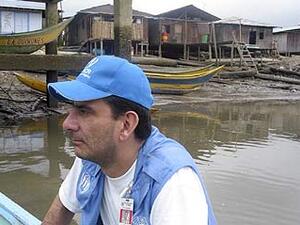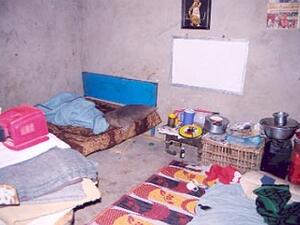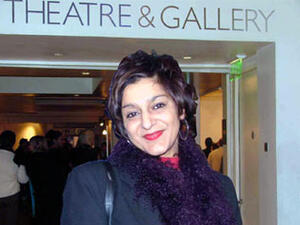UNHCR takes budding Afghan reporters to Pakistan's refugee camps
UNHCR takes budding Afghan reporters to Pakistan's refugee camps
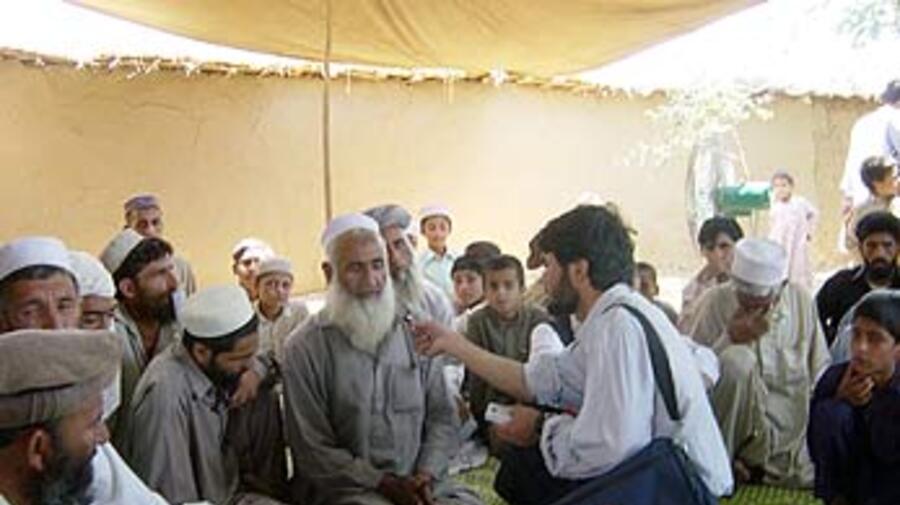
An Afghan radio reporter interviewing Afghan refugees during a media trip to Pakistan's camps.
KABUL (UNHCR) - In an effort to help Afghan journalists report first-hand on the concerns of their country's refugees, as the UN refugee agency's Afghan spokesman, I recently escorted a group of Afghan journalists to Pakistan so that they could interview Afghan refugees living in camps.
Seven print, television and radio reporters participated in the four-day trip in mid-May to Peshawar in Pakistan's North-West Frontier Province, including two Afghan women.
"If it wasn't for UNHCR organising this trip for journalists, we could never have been able to speak directly to these refugees living in Pakistan," said Manija Ahadi, a reporter for BBC's Educational Radio Programme.
Like many other institutions in the country, news media in Afghanistan are severely under-funded, unable to pay adequate staff salaries or provide transportation for reporters even to nearby areas around the capital, Kabul. The emerging independent media are even more hard pressed to make ends meet.
While direct media funding is beyond UNHCR's mandate in Afghanistan, the refugee agency whenever possible supports their reporting activities by providing transportation to returnee communities and regularly discussing with them to help identify potential news stories.
Providing a stark contrast to the dismal financial state of the Afghan media is the enthusiasm of young reporters, developing their profession through the budding press freedom in the country following the fall of the Taliban.
Upon arrival in Peshawar, the participating Afghan reporters went to Shalman camp and, hungry for stories, immediately scrambled to speak to the refugees there.
The reporters learnt about the concerns and expectations of refugees in returning to Afghanistan. Some of the refugees had already made up their minds to go back to their homeland, but many were undecided about their future moves.
Some refugees told the reporters they didn't have land in Afghanistan and expressed their reluctance to move out from the Pakistani camps after decades of living there. They had access to various facilities - such as water, sanitation, health clinics, education and shelter - in the camps, which may not be available back in their war-torn villages.
"We never thought of how attached these people were to living in camps," said Abdul Malik Hasim of Radio Afghanistan.
The second day, the group went to Jalozai camp and interviewed local officials and refugees. They also visited schools and a carpet factory run by Afghan refugees of Uzbek ethnicity before proceeding to Katcha Garhi and Monda camps.
One of the highlights of the visit was to see UNHCR's newly opened iris-validation centre in Hayatabad, where returning refugees are registered. The Afghan reporters were keen to see how the iris-recognition technology works, and a reporter from the "Good Morning Afghanistan" radio programme filed a live interview on the spot through a phone link with Kabul studio.
The group then visited the Advice and Legal Assistance Centres in Bord, which provides legal advice, education and representation to urban refugees in Peshawar. The International Catholic Migration Commission (ICMC) staff who run these centres also visit refugees in their settlements to provide legal counselling and job advice.
The journalists also had a chance to interview the Afghan Deputy Minister of Refugees and Reparation, Mohammad Nayeem Ghiasi, who was transiting Peshawar on the way to Islamabad. Ghiasi was to participate in a Tripartite Commission that was meeting for the first time after the signing of an agreement in March between the governments of Afghanistan and Pakistan and UNHCR.
The Afghan press asked the deputy minister many questions about the refugees and their problems, including the question of land allocation for landless refugees and the government's plans to help them return home.
"We will continue to meet every three months to discuss the voluntary repatriation programme for Afghan refugees in Pakistan, which is to continue for three more years," Ghiasi told reporters.
On their return leg, the Afghan radio and television journalists followed a family back to Kabul. Their documentary film, which depicts an Afghan refugee family's entire journey home, will be aired on TV Afghanistan, the main television channel in Kabul.
Taking Afghan journalists across the border to Pakistan was a capacity-building exercise for the Afghan media professionals, and I found out how difficult it was to organise a cross-border media trip.
But it was also a great experience for me to learn more about the problems of refugees living in camps. I can now better appreciate their concerns and the obstacles to return that they face, which will help me in my work to advocate their needs.
It also gave me a new appreciation for what I've learnt while working for UNHCR. After spending a year working with the refugee agency's press office while continuing my studies in engineering at Kabul University, I recently decided to switch my major to a night course in journalism.
By Mohammad Nader Farhan
UNHCR Afghanistan


